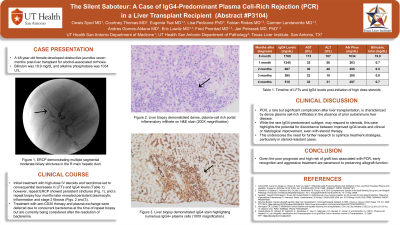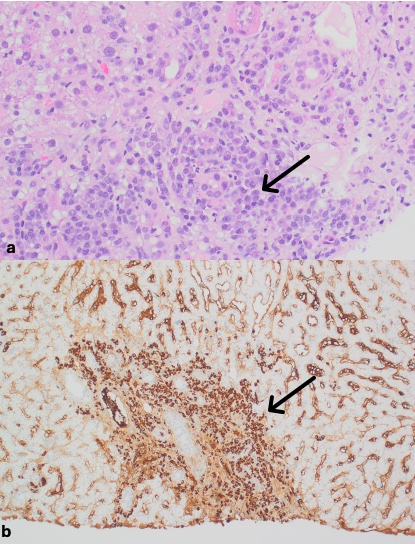Monday Poster Session
Category: Liver
P3104 - The Silent Saboteur: A Case of IgG4-Predominant Plasma Cell-Rich Rejection (PCR) in a Liver Transplant Recipient
Monday, October 28, 2024
10:30 AM - 4:00 PM ET
Location: Exhibit Hall E

Has Audio

Owais N. Syed, MD
University of Texas Health San Antonio
San Antonio, TX
Presenting Author(s)
Owais N. Syed, MD1, Courtney Thomas, DO1, Eugenia Tsai, MD1, Lisa Pedicone, PhD2, Fabian Rodas, MD3, Carmen Landaverde, MD4, Andres Gomez-Aldana, MD2, Eric Lawitz, MD1, Fred Poordad, MD5, Jan Petrasek, MD, PhD2
1University of Texas Health San Antonio, San Antonio, TX; 2Texas Liver Institute, San Antonio, TX; 3The Texas Liver Institute, San Antonio, TX; 4Texas Liver Institute, Austin, TX; 5UTHSCSA, Texas Liver Institute, San Antonio, TX
Introduction: Plasma cell-rich rejection (PCR) is an uncommon but potentially devastating cause of late liver allograft dysfunction. We present a challenging case of steroid-resistant IgG4-predominant PCR in a liver transplant recipient.
Case Description/Methods: A 48-year-old female developed obstructive jaundice seven months post-liver transplant for alcohol-associated cirrhosis. Bilirubin was 19.9 mg/dL and alkaline phosphatase was 1034 U/L. ERCP revealed multiple non-anastomotic inflammatory biliary strictures. A liver biopsy demonstrated extensive portal and lobular plasmacytic inflammation (Figure 1a) and cholestasis suggesting a major duct obstruction. Immunohistochemical staining (Figure 1b) and elevated serum IgG4 (1769 mg/dL) confirmed IgG4-predominant PCR. Subsequent IgG4 levels at the one-month, two-month, three-month and four-month post treatment initiation improved to 1245 mg/dL, 687 mg/dL, 595 mg/dL and 463 mg/dL respectively. Despite initial treatment with high-dose IV steroids and tacrolimus, repeat ERCP showed persistent strictures, and a repeat biopsy four months later revealed persistent plasmacytic inflammation and stage 2 fibrosis. Treatment with anti-CD20 therapy and plasma exchange were deferred due to concurrent bacteremia at the time of repeat biopsy but are considered after the resolution of bacteremia.
Discussion: PCR, a rare but significant complication after liver transplantation, is characterized by dense plasma cell-rich infiltrates in the absence of prior autoimmune liver disease. While the rare IgG4-predominant subtype, may respond to steroids, this case highlights the potential for discordance between improved IgG4 levels and clinical or histological improvement, even with steroid therapy. This underscores the need for further research to optimize treatment strategies, particularly in steroid-resistant cases. Given the poor prognosis and high risk of graft loss associated with PCR, early recognition and aggressive treatment are paramount to preserving allograft function.

Disclosures:
Owais N. Syed, MD1, Courtney Thomas, DO1, Eugenia Tsai, MD1, Lisa Pedicone, PhD2, Fabian Rodas, MD3, Carmen Landaverde, MD4, Andres Gomez-Aldana, MD2, Eric Lawitz, MD1, Fred Poordad, MD5, Jan Petrasek, MD, PhD2. P3104 - The Silent Saboteur: A Case of IgG4-Predominant Plasma Cell-Rich Rejection (PCR) in a Liver Transplant Recipient, ACG 2024 Annual Scientific Meeting Abstracts. Philadelphia, PA: American College of Gastroenterology.
1University of Texas Health San Antonio, San Antonio, TX; 2Texas Liver Institute, San Antonio, TX; 3The Texas Liver Institute, San Antonio, TX; 4Texas Liver Institute, Austin, TX; 5UTHSCSA, Texas Liver Institute, San Antonio, TX
Introduction: Plasma cell-rich rejection (PCR) is an uncommon but potentially devastating cause of late liver allograft dysfunction. We present a challenging case of steroid-resistant IgG4-predominant PCR in a liver transplant recipient.
Case Description/Methods: A 48-year-old female developed obstructive jaundice seven months post-liver transplant for alcohol-associated cirrhosis. Bilirubin was 19.9 mg/dL and alkaline phosphatase was 1034 U/L. ERCP revealed multiple non-anastomotic inflammatory biliary strictures. A liver biopsy demonstrated extensive portal and lobular plasmacytic inflammation (Figure 1a) and cholestasis suggesting a major duct obstruction. Immunohistochemical staining (Figure 1b) and elevated serum IgG4 (1769 mg/dL) confirmed IgG4-predominant PCR. Subsequent IgG4 levels at the one-month, two-month, three-month and four-month post treatment initiation improved to 1245 mg/dL, 687 mg/dL, 595 mg/dL and 463 mg/dL respectively. Despite initial treatment with high-dose IV steroids and tacrolimus, repeat ERCP showed persistent strictures, and a repeat biopsy four months later revealed persistent plasmacytic inflammation and stage 2 fibrosis. Treatment with anti-CD20 therapy and plasma exchange were deferred due to concurrent bacteremia at the time of repeat biopsy but are considered after the resolution of bacteremia.
Discussion: PCR, a rare but significant complication after liver transplantation, is characterized by dense plasma cell-rich infiltrates in the absence of prior autoimmune liver disease. While the rare IgG4-predominant subtype, may respond to steroids, this case highlights the potential for discordance between improved IgG4 levels and clinical or histological improvement, even with steroid therapy. This underscores the need for further research to optimize treatment strategies, particularly in steroid-resistant cases. Given the poor prognosis and high risk of graft loss associated with PCR, early recognition and aggressive treatment are paramount to preserving allograft function.

Figure: Figure 1. Liver biopsy demonstrated (a) dense, plasma-cell rich portal inflammatory infiltrate on H&E stain (200X magnification) and (b) IgG4 stain highlighting numerous IgG4+ plasma cells (100X magnification).
Disclosures:
Owais Syed indicated no relevant financial relationships.
Courtney Thomas indicated no relevant financial relationships.
Eugenia Tsai indicated no relevant financial relationships.
Lisa Pedicone indicated no relevant financial relationships.
Fabian Rodas indicated no relevant financial relationships.
Carmen Landaverde indicated no relevant financial relationships.
Andres Gomez-Aldana indicated no relevant financial relationships.
Eric Lawitz indicated no relevant financial relationships.
Fred Poordad indicated no relevant financial relationships.
Jan Petrasek indicated no relevant financial relationships.
Owais N. Syed, MD1, Courtney Thomas, DO1, Eugenia Tsai, MD1, Lisa Pedicone, PhD2, Fabian Rodas, MD3, Carmen Landaverde, MD4, Andres Gomez-Aldana, MD2, Eric Lawitz, MD1, Fred Poordad, MD5, Jan Petrasek, MD, PhD2. P3104 - The Silent Saboteur: A Case of IgG4-Predominant Plasma Cell-Rich Rejection (PCR) in a Liver Transplant Recipient, ACG 2024 Annual Scientific Meeting Abstracts. Philadelphia, PA: American College of Gastroenterology.
